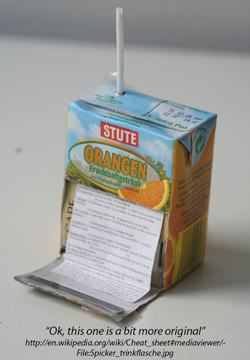Since it is the end of the semester, and exams are in the minds of many, it seems appropriate to return to a topic I put on hold. Rutgers University made the news when the New York Times published an article about software that was used in online courses to prevent cheating. Students are of course already trying to find ways to hack, bypass, and otherwise deceive the distance proctoring software, which is called Proctortrack.
The Wabash Center featured an article a few months ago which suggested what may be a better way: let them cheat.
I blogged about this some years ago myself, proposing a “new kind of final.” Recalling information, while not unimportant, is less important when information is available at one’s fingertips (literally). And so let’s give them access to anything they can find online, and test their ability (1) to find legitimate information, (2) to explain how they know the information in question is trustworthy, and (3) use that information in a way that reflects higher order learning.
What do readers think? Do we need to rethink the way we approach learning and examinations?
See also Roger Nam’s follow-up to his article mentioned previously. And see below an example from Nam’s article which illustrates that it is not just online learners one has to worry about cheating.













